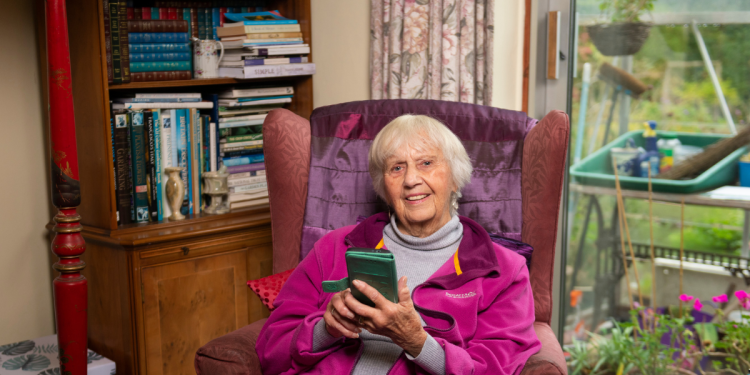How to make a great befriending call
A guide for new volunteers – as advised by our older people.
As a Call Companion volunteer, you’re making an incredible difference in someone’s life by offering companionship and a friendly chat, but we know, it’s not always easy to know where to start. We sought help from members of our older person’s advisory group to create a “how to” guide for our Call Companion volunteers with top tips and suggestions - and here's a summary of what they said:
1. Get to know each other – and let the conversation flow
-
“It is important for the volunteers to introduce themselves to identify common interests.” Start by introducing yourself and finding shared interests to create a comfortable environment for conversation.
-
“I think it helps to talk about things we have in common.” Focusing on common ground can help build rapport and ease into a conversation.
-
“Allow the person you are calling to lead the conversation in the direction they want.” Support the older person to guide the flow of the conversation to make them feel more comfortable.
-
“It’s important to give them space to share what’s on their mind.” Respect your Call Companion’s pace, and let them open up about what matters to them.
2. Top tips for your first call
-
“Just give it a go and enjoy it.” Try not to stress over perfection; just start the conversation, enjoy the experience, and see where it takes you.
-
“Initially swap stories and interests to find some common ground for conversations. Perhaps discuss some major news* (see topics to avoid below) which is happening.” Share something about yourself to help the conversation flow and talk about current events or shared hobbies.
-
“Speak clearly.” Communication is key – especially if the person has any hearing difficulties.
-
“Patience, being understanding and not judgmental.” Take your time and approach each conversation with patience, avoiding any judgment.
-
“Take note of, and respond appropriately to, the older person’s state of mind.” Pay attention to their mood and adjust your approach if they’re feeling down or nervous. As you get to know your Call Companion better, this will become easier.
3. Things to remember before making your first call
-
“You are someone to talk to who can give an unbiased opinion and the person may want to discuss things they don't want to talk to family about.” You might be the person they feel comfortable opening up to about sensitive issues, so listen with empathy and without judgment.
-
“It can be an up and down conversation – the older person might not be ready to answer the call and be anxious. [You] have to be patient and try to prompt conversation.” Understand that the conversation might be slow to start, so take some time if the older person is not feeling ready to talk.
-
“Need to be willing to get to know their older person and remember details about them.” Building a meaningful connection requires remembering small details that show you care about the other person’s life and interests.
-
“It’s reciprocal – sometimes they may help you too.” Remember that the relationship goes both ways; you may find that the older person provides support, even if it's just a listening ear.
-
“If they have hearing issues, be aware of that.” If your older person has hearing difficulties, be mindful of speaking clearly and slowly to ensure they can understand you.
4. Good topics to start a conversation
-
“Everyday questions – do you like gardening or football etc.” Start with universal, neutral topics like hobbies or interests to get the conversation going.
-
“Volunteer should introduce themselves, so their older person knows who they are and some background information about them.” Let your call companion know a bit about you as well, to make the conversation feel more personal.
-
“Ask about how their older person is and about their day.” A simple question like 'How are you today?' can help open up the conversation.
-
“Weather – the British always talk about this and family and holidays.” Weather is a classic go-to topic for breaking the ice, especially if you’re unsure where to start.
-
“No personal questions.” Avoid prying into personal or sensitive topics until you’ve built trust.
5. What to avoid discussing
-
“Politics – keep away as it’s divisive so it’s best to avoid.” Politics can be controversial, so it’s safer to steer clear of it unless your call companion brings it up.
-
“Religion – this is very subjective and could be a sensitive topic.” Religion can be deeply personal and sensitive, so it’s best to avoid unless you know your call companion is open to discussing it.
-
“COVID – personally not keen on talking about COVID because of family losses.” Some topics, like COVID and personal loss, can be difficult to discuss for some older people. Be mindful of the emotional impact.
-
“Personal questions about family until knowing for a while can be very sensitive.” Avoid asking personal or family-related questions too early. It’s important to build a relationship first.
-
Every person is different – some may be happy to talk about a wide range of topics, so let your call companion guide the conversation. “Nothing that should be avoided. Some people are happy to talk about anything, and it will depend on the person's interests.”
6. Keep it light and fun
-
“Just enjoy it.” The goal is to enjoy the conversation and not put too much pressure on yourself or the older person.
-
“It’s a link to the outside world especially if your call companion is housebound or only goes out occasionally.” Your call can offer a much-needed connection to the outside world. The time and care you give to each call will mean the world to your companion. Take it one call at a time, and remember that every conversation helps create a meaningful connection.
-
View



